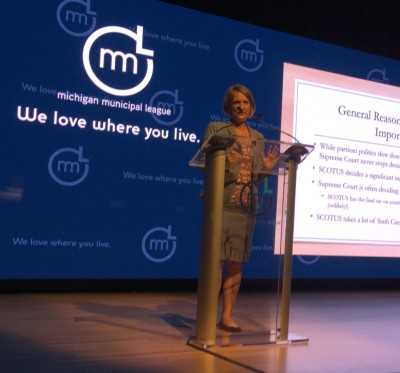 U.S. Supreme Court decisions may seem far removed from the day-to-day activities of local government, but they have more local effect than you might think. The U.S. Supreme Court is always important to cities, says Lisa Soronen, executive director of the State and Local Legal Center. The SLLC files amicus curiae brief in support of state and local governments in the U.S. Supreme Court.
U.S. Supreme Court decisions may seem far removed from the day-to-day activities of local government, but they have more local effect than you might think. The U.S. Supreme Court is always important to cities, says Lisa Soronen, executive director of the State and Local Legal Center. The SLLC files amicus curiae brief in support of state and local governments in the U.S. Supreme Court.
Soronen cites several reasons that cities should keep their eye on SCOTUS decisions. Chief among them are that SCOTUS decides a lot of cases each term that impact cities. Often, they’re deciding constitutional cases that affect cities.
Being aware of the leanings of the court justices is equally important. Conservative and moderate justices tend to be good for cities. They are particularly good on issues related to qualified immunity, employment, closing the courthouse door, and federalism and preemption. When it comes to matters of land use and free speech, their decisions are not particularly helpful to cities.
Soronen cities several cases that illustrate the power of Supreme Court Justice Kennedy:
- Murr v Wisconsin – People purchased very small plots of land, but the septic system couldn’t handle all those small lots. The city said that lots had to be at least an acre, and that property owners couldn’t sell lots unless they were an acre or more. This was the first takings win for local governments since 2010. Justice Kennedy wrote for the majority.
- Reed v Town of Gilbert, AZ – decided in 2015, it changed the law regarding sign codes. The decision stated that content-based distinctions in sign codes are unconstitutional. In the decision’s aftermath, most cities have had to rewrite their sign ordinances.
- Quill v North Dakota – decided in 1992, the decision indicated that states and local governments can force out of state retailers to collect sales tax. That wasn’t a big deal in 1992, but with the explosion of online sales, it’s a $23 billion deal today, in 1992. In 2015, Colorado passed a law that online retailers have to inform taxpayers and the Department of Revenue of online purchases – prompting people to pay taxes. Justice Kennedy wrote a concurring opinion saying that Quill should be overturned. The case went back to 10th Circuit Court, which rule that the law doesn’t violate Quill. Justice Gorsuch wrote a concurring opinion strongly suggesting that Quill should be overturned. South Dakota has now passed a law challenging Quill and the Supreme Court will hear it next year.

